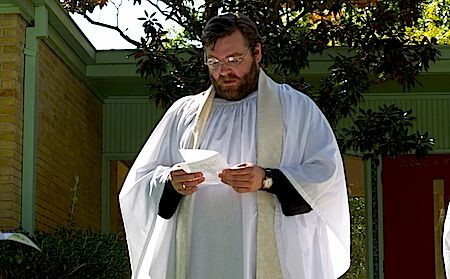Getting Ready for Sunday
It's fitting to encounter this reading as we are moving into the time of year when many churches are considering the coming year’s budget, and turning attentions toward pledge campaigns and related matters. Most churches with which I am familiar don’t spend money extravagantly, but the need for money is fundamentally no different for churches than it is for any family. I would like to offer four observations about these things.
1) What to do with your money is a matter for prayer.
We sometimes have a propensity to go off, as it were, half-cocked; to make decisions in an unconsidered or unadvised way. This, of course, is imprudent and wrong. And the more important or substantial a decision is, the more considered and advised it should be. And the greatest advisor, or Counselor, in our lives is the Holy Spirit. Jesus said, “when the Counselor comes, whom I shall send to you from the Father, even the Spirit of truth, who proceeds from the Father, he will bear witness to me,” (John 15.26). So we should pray to Jesus to send us the Holy Spirit to enlighten us, and to enable us to give of ourselves in a Christian way – that is, with reference to Jesus, to whom the Holy Spirit bears witness. If, when we are trying to discern the right decision to make, we sometimes feel perplexed, we should pray. The epistle of St. James says, “You do not have, because you do not ask,” (James 4.2). If we would like clarity, we should ask God for it, with simple faith. So before you decide what to do with your money, pray about it. Ask the Holy Spirit to guide you.
2) You should make a will, and make sure it is up to date.
A little-regarded passage in the Book of Common Prayer (page 445) says that priests are “to instruct [their] people, from time to time, about the duty… of all persons to make wills, while they are in health, arranging for the disposal of their temporal goods, not neglecting, if they are able, to leave bequests for religious and charitable uses.” This is a duty that we owe to God, who has entrusted us with every temporal good we enjoy. As stewards of these things under God’s authority, therefore, we have a duty not to treat them with prodigality in life or in death, but to ensure that they are directed toward the glory of God. This likewise is a duty that we owe to our near relations – i.e. not to saddle them with the enormous burden of disposing of an estate in chaos when we die. After providing for our surviving dependents, leaving bequests to the Church is a sure way of orienting the fruit of our labor, and the residue of our lives in this world, toward the glory of God.
3) Giving money to divine purposes is a good-faith effort to discharge our debt.
The epistle of James says “Every good endowment and every perfect gift is from above, coming down from the Father of lights with whom there is no variation or shadow due to change,” (James 1:17). Similarly, Paul asks, “What have you that you did not receive?” (1 Cor. 4:7). All that we have and all that we are comes from God. In the grand scheme, we are all beggars, all living off of divine charity. If you are tempted to think that you have much because you are smart or talented, you might ask yourself: where did your intelligence and your talent come from?
4) Giving money to God’s purposes is Eucharistic, a way to participate in the mystery of the cross.
We owe God everything that we have. The old Prayer Book Eucharistic canon speaks this way explicitly: “And here we offer and present unto thee, O Lord, our selves, our souls and bodies, to be a reasonable, holy, and living sacrifice unto thee…” God has given us everything, and we so we owe him everything. Most of us spend the majority of our time transmuting the substance of our lives and our energies into money, but that transmutation is not like a divine tax loophole, an end-run around God’s just claim over the whole of my being. The income tax rate of the Kingdom of God is 100%, and there will be nowhere to hide our assets when Christ at last fills all things, searching even the recesses of our hearts. Everything we have and everything that we are must be devoted to God, in union with Jesus Christ, who offered the entirety of his being to his Father acceptably on the cross. THAT must be the shape of our giving.
Thinking this way will require that we cease thinking the way that America has habituated us to think – namely that Sunday is the day on which we devote our time and energies to God. The truth is that God wants all of us. All of our time, all of our money, all of our being, “our selves, our souls and bodies,” all day, every day. While this may demand a rejiggering of our assumptions (what the New Testament calls “metanoia” or “repentance”), there’s a powerful incentive to get it done – i.e. that we might one day have spoken to us the words of the Savior, “Well done, good and faithful servant; you have been faithful over a little, I will set you over much; enter into the joy of your master.”



